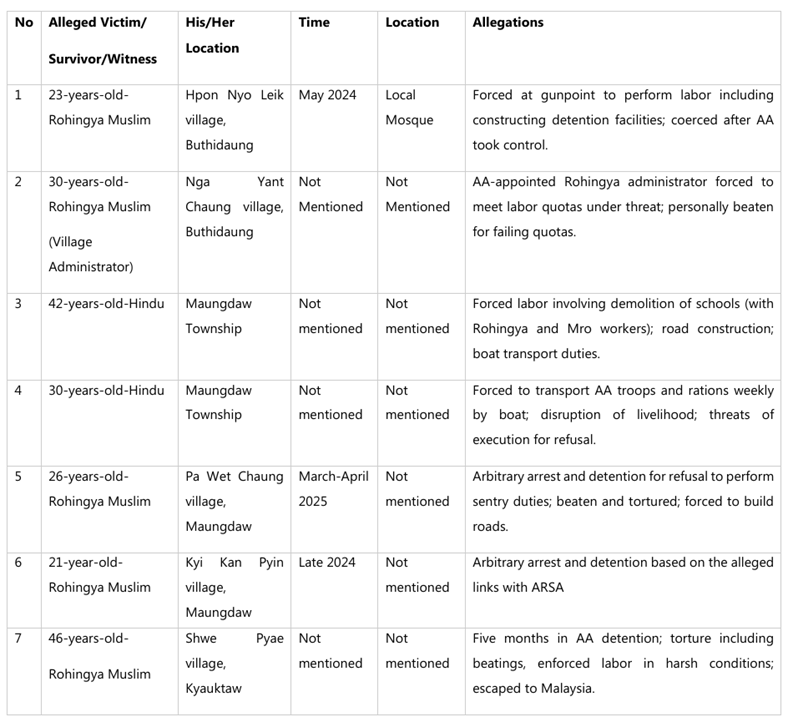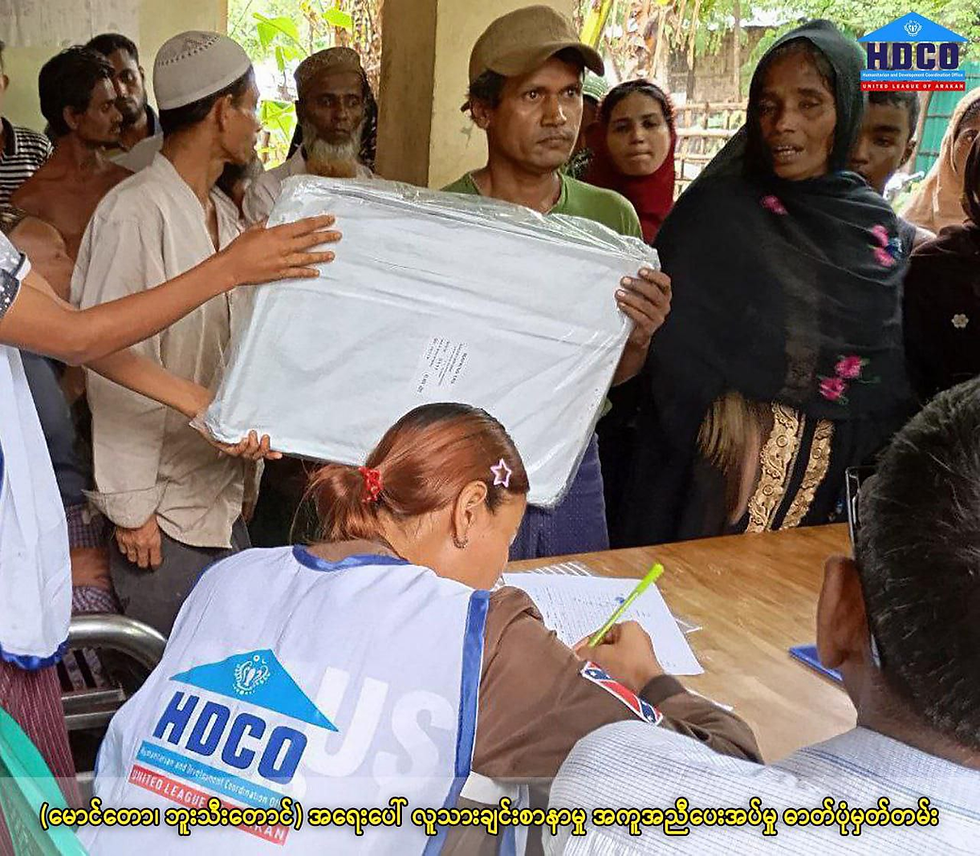Fortify Rights: Cease Spreading Lies About the Arakan Army
- globalarakannetwork

- 7 days ago
- 5 min read
Report Analysis
Global Arakan Network October 23, 2025

The quote, “If you tell a lie big enough and keep repeating it, people will eventually come to believe it,” often attributed to Joseph Goebbels, a Nazi propagandist and extremist fascist, reflects a dangerous tactic.
Unlike during World War II, such “big lies” can now originate from groups like Fortify Rights (FR), a self-serving organization with leftist, populist, and internationalist leanings, led by figures such as Matthew Smith, John Quinley III, Nickey Diamond, and others focused on Myanmar.
Far from championing individual human rights, FR appears to target resistance groups like the Arakan Army (AA) in coordination with extremist elements among Muslim diaspora activists.
FR’s recent reports on the AA are not isolated but part of a pattern of baseless accusations under various titles and strategies. Fortunately, credible authorities largely dismiss these unverified claims.
In 2025, FR issued at least two reports targeting the AA. Despite their sensational titles, the reports lack substance and tangible evidence. On January 23, 2025, FR released “International Criminal Court: Investigate Arakan Army’s Filmed Execution of Prisoners of War.” The AA, however, publicly acknowledged the incident, and the perpetrators were killed during a military operation in Arakan.
A second report, published on July 23, 2025, titled “International Criminal Court: Investigate Arakan Army War Crimes Against Rohingya,” alleged widespread abductions, torture, killings, and beheadings of Muslim Bangagya (Rohingya) civilians by the AA in makeshift detention centers and villages. It claimed a systematic pattern of abuse, including five beheadings, based on interviews with 39 survivors conducted from April to July 2025. The report ultimately calls for an ICC investigation of the AA.
FR’s reports suffer from two major flaws: the credibility of their sources and the motivations of their leadership. First, FR frequently relies on accounts from former or active RSO/ARSA fighters who fled to Bangladesh after battlefield losses and now pose as victims or eyewitnesses.
Second, FR’s neutrality and professionalism are questionable. Widely perceived as biased toward Muslim communities and against the Arakanese and United League of Arakan (ULA) leadership, FR’s claims appear politically motivated rather than driven by justice or peace. The Global Arakan Network (GAN) has provided a detailed analysis of the July 2025 report, and observers are encouraged to review its findings.
FR’s latest report claims to have interviewed 21 survivors and witnesses of alleged AA forced labor practices between November 2024 and October 2025. However, it references only 13 interviewees, a recurring issue in FR’s documentation, as detailed below:


First of all, among the 13 interviewees cited in Fortify Rights’ (FR) report, two are Hindu and one is Chakma (Daingnet). This indicates a shift in FR’s tactics, now including other ethnic groups to target the Arakan Army (AA). However, FR continues to rely heavily on Muslim accounts, sidelining Hindu and Chakma testimonies, likely because the latter cannot be manipulated to support FR’s “big lie” narrative. Another reason of including other groups is possibly to legitimate their claims of atrocities against the AA that the latter committed crimes against all groups except Rakhine.
Second, a key flaw in FR’s reports is the lack of specific details about alleged incidents. Of the 13 incidents cited, only three include the time and location, rendering the information unreliable or potentially fabricated. These vague, sensational narratives lack credible evidence to substantiate FR’s accusations. It also means that anyone or any groups can create fabricated stories by using ‘eyewitness’ or ‘survivor’ label just to tarnish image of an organization with no tangible evidence.
Thirdly, the credibility of FR’s sources is also questionable. It is unclear whether these so-called survivors exist or are merely fabrications. FR’s testimonies often rely on individuals who fled to Bangladesh or Malaysia, some of whom may be former or active RSO/ARSA fighters posing as victims or eyewitnesses.
For example, Al Jazeera once used an active ARSA member, who fled to Bangladesh in 2017, as an eyewitness for the Htan Shauk Khan allegation. Thus, even if FR claims a source is an eyewitness, they could be an ARSA affiliate shifting blame onto the AA, making FR’s reports highly unreliable.
Finally, an obvious and unforgivable falsification appears in Fortify Rights’ (FR) latest report. In Case No. 5, the report claims that a 25-year-old Rohingya man from Pa Wet Chaung village in Maungdaw Township endured “forced recruitment, arbitrary arrest, beatings, torture, and forced road construction.” In reality, Pa Wet Chaung is not a Muslim village but a Rakhine ethnic one. This glaring discrepancy highlights FR’s reliance on fabricated survivor testimonies to craft sensational narratives.

Rational and Logical Evidence Beyond Sensational Narratives
While FR’s recent reports allege AA atrocities, observers can assess their plausibility using evidence from the ground. In Maungdaw district, the United League of Arakan (ULA) has fostered positive relations with the Muslim community, as demonstrated in three ways:
Judicial Inclusion: Before capturing Maungdaw in December 2024, the ULA established the Muslim Jury Team to address judicial disputes within the Rohingya community.
Advisory Body: The newly formed Maungdaw District Muslim Affairs Council advises the ULA on Muslim-related issues, with authority to make decisions at the community level.
Institutional Participation: Muslims increasingly participate in ULA institutions, including police, health, education, social assistance, judiciary, and administration. Notably, the ULA appointed a Muslim deputy township administrator in Maungdaw. The Irrawaddy reports that approximately 5,000 Rohingya staff work in the ULA administration, as translated by the Global Arakan Network (GAN).
Given these developments, serious human rights violations against Muslims by the AA as mentioned by the FR's report are highly unlikely. Existing political, administrative, and judicial mechanisms under the ULA can address any such issues. Thus, FR’s reports appear designed to undermine the growing cooperation between the ULA and the Muslim community rather than expose genuine injustices.

Problematic Selective Reporting by FR
FR’s selective reporting is a critical concern. While it has documented some ARSA crimes against Muslims in Bangladesh, FR consistently ignores ARSA’s atrocities against non-Muslim minorities in Buthidaung and Maungdaw townships.
Since November 13, 2023, ARSA has killed at least 40 civilians, injured six, and arrested 24, with the lack of updates on these arrests suggesting a death toll potentially exceeding 60. However, FR, the Independent Investigative Mechanism for Myanmar (IIMM), and some UN reports overlook these crimes, likely because they involve ARSA, a Muslim-affiliated group, targeting non-Muslims.

Just yesterday on October 22, 2025, in southern Maungdaw, ARSA killed two women and injured two others. A three-year-old girl was found crying beside her mother’s body. These incidents are not isolated but part of a pattern of ARSA attacks against non-Muslims in Maungdaw.

International observers and stakeholders must prioritize tangible evidence over premature conclusions in the complex landscape of northern Arakan. Fortify Rights’ (FR) reports are inconsistent with the ground reality, where communities face socioeconomic hardships and insecurity due to coordinated junta airstrikes and terrorist activities by the Arakan Rohingya Salvation Army (ARSA).
FR’s narratives fail to reflect local realities, instead exemplifying external manipulation of domestic suffering and complexity. Consequently, Western embassies in Myanmar and donor organizations should exert greater pressure and scrutiny on FR’s leadership to ensure accountable, balanced reporting on atrocities committed by Islamic extremist and jihadist groups like ARSA against minorities in northern Arakan.




_edited.png)



